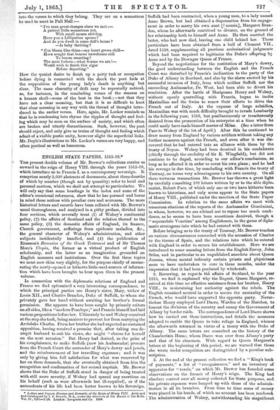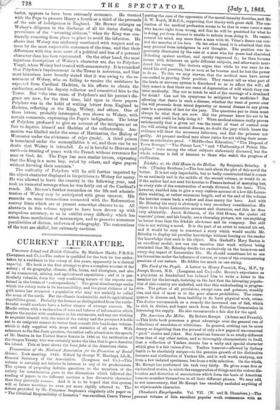ENGLISH STATE PAPERS, 1515-18.*
THE present double volume of Mr. Brewer's collections carries us onward-in the reign of Henry VIII. through the years 1515-18, which introduce us to Francis I. as a contemporary sovereign. It comprises nearly 5,000 abstracts of documents, about three-fourths of which by number (though not by quantity) refer to local and personal matters, which we shall not attempt to particularize. We will only say that some headings in the index and some of the editor's occasional references, show that he has perused and borne in mind these notices with peculiar care and acuteness. The more historical letters and records have been collated with Mr. Brewer's usual thoroughness, and analyzed in a pithy preface, divided into four sections, which severally treat (1) of Wolsey's continental policy, (2) the affairs of Scotland and the relation thereof to the same policy, (3) the domestic affairs of England, its finance, Church government, sufferings from epidemic maladies, &c., the general character of WoLsey's adminictration, and other subjects incidentally handled, and (4) the publication of Erasmus's Recension of the Greek Testament and of Sir Thomas More's Utopia, the former as a virtual product of English scholarship, and the latter as an imagination grounded on Fmglish manners and institutions. Over the first three topics we must now skim very slightly, for the purpose chiefly of enume- rating the newly-opened or hitherto little-used sources of informa- tion which have been brought to bear upon them in the present volume.
In connection with the diplomatic relations of England and France we find epitomized a very interesting correspondence, to which the principal parties are Henry's sister, Mary, widow of Louis XII., and Charles Brandon, Duke of Suffolk, to whom she privately gave her hand without awaiting her brother's formal permission. She appears to have been sought by princely suitors on all sides, like a "modern Penelope ;" and Francis himself had laid various propositions before her. Ultimately he and Wolsey connived at the step she took, being anxious to prevent her from marrying the Archduke Charles. From her brother she had expected no sustained opposition, having received a promise that, after taking one de- crepit husband to suit his views, she might " choose for herself on the next occasion." But Henry had desired, as the price of his complaisance, to make Suffolk (now his Ambassador) procure from the French Court the surrender of Mary's dowry and jewels, and the reimbursement of her travelling expenses ; and it was only by giving him full satisfaction for what was recovered by her on these demands, that she eventually obtained from him the recognition and confirmation of her second nuptials. Mr. Brewer shows that the Duke of Suffolk stood in danger of being treated with still more severity, if Wolsey had spared any exertions on his behalf (such as were afterwards but ill-requited), or if the antecedents of his life had been better known to his Sovereign.
* Leiters and Papers, Foreign and Dosnestie, of the Reign of Henry VIII. Arranged and Catalogued by J. S. Brewer, M.A., uuder the direction of the Master of the Rolls. Vol. II., 1615-1118. London: Longman and Co. 1864.
Suffolk had been contracted, when a young man, to a lady named Anne Brown, but had obtained a dispensation from his engage- ment in order to marry his own aunt fy cousin], Margaret Bran- don, whom he afterwards contrived to divorce, on the ground of her relationship both to himself and Anne. He then married the latter, who had now died, leaving one child behind her. These- particulars have been obtained from a bull of Clement VII.. dated 1528, supplementing all previous ecclesiastical judgments which had been required to legitimize the Duke's offspring b.) Anne and by the Dowager Queen of France. Beyond the negotiations for the restitution of Mary's dowry, the good understanding between the English and the French Court was disturbed by Francis's inclination to the party of the Duke of Albany in Scotland, and also by the alarm excited by his successful invasion of Italy, from which neither Suffolk nor the succeeding Ambassador, Dr. West, had been able to divert his resolution. After the battle of Marignano Henry and Wolsey, without openly quarrelling with Francis, began to incite Maximilian and the Swiss to renew their efforts to drive the French out of Italy. At the expense of large subsidies, Maximilian was with much difficulty brought to invade Lombardy in the following year, 1516, but pusillanimously or treacherously desisted from the prosecution of his enterprise at a time when he could easily have made himself master of Milan. (See a letter from Pace to Wolsey of the 1st of April.) After this he continued to draw money from England by various artifices without taking any further measures against the French, and even after it was dis- covered that he had entered into an alliance with them by the treaty of Noyon. Wolsey had been deceived in his confederate (chiefly through the credulity of Sir R. Wingfield), but did not continue to be duped, according to our editor's conclusions, sa long as he affected it in order to cover his own plans ; and he had his revenge in due time, by concluding with Francis the treaty of Tournay, on terms very advantageous to his own country. On all these tortuous transactions Mr. Brewer has thrown a great light by carefully consulting 189 letters written by or to the able diplo- matist, Robert Pace, of which only one or two have hitherto been known to historians, and only seven appear in the State papers of Henry VIII, published under the sanction of the State Paper Commission. In relation to the same affairs we meet with numerous citations of the reports of the Ambassador Giustinia.ni, in whom, however, we are advised not to repose too much confi- dence, as he seems to have been sometimes deceived, though a "supersubtle Venetian" among Englishmen, in the game of diplo- matic stratagems into which he had entered with them.
Before bringing us to the treaty of Tourney, Mr. Brewer touches on various circumstances connected with the accession of Charles to the throne of Spain, and the relations into which he entered with England in order to secure his establishment. Here we are introduced to some amusing letters from the English Envoy, John Stiles, and in particular to an unpublished anecdote about Queen Joanna, whose mental infirmity certain priests and physicians seem to have undertaken to cure in three months, under the impression that it had been produced by witchcraft.
2. Recurring, as regards the affairs of Scotland, to the year 1515, we find it explained why the Regent, Queen Margaret, re- ceived at this time no effective assistance from her brother, Henry VIII., in maintaining her authority against the rebels. The English remained neutral in order to secure the neutrality of the- French, who would have supported the opposite party. Never- theless Henry employed Lord Deere, Warden of the Marches, to foment the divisions of the country and annoy the Government of Albany by border raids. The correspondence of Lord Deere shows how he carried out these instructions, and details the measures adopted to enable the Queen to take refuge in England, whence she afterwards returned in virtue of a treaty with the Duke of Albany. The same letters are consulted on the history of the Chamberlain Hume, whom Dacre won over from Albany's party and that of his clansmen. With regard to Queen Margaret's letters at the beginning of this period, we are warned that those she wrote under compulsion are distinguished by a peculiar sub- scription.
3. At the end of the present collection we find a "King's book of payments," a list of " recognisances," and an inventory of apparatus for "revels," on which Mr. Brewer has founded some observations on the finance of Henry's reign. The King had absolute control over all money collected for State purposes, and
his private expenses were lumped up with those of the adminis- tration in all its branches. From time to time sums of money were placed in his hands, of which no account has been rendered. The administration of Wolsey, notwithstanding his ma' gracent tastes, appears to have been extremely economic. He treated with the Pope to procure Henry a fourth or a third of the proceeds of the sale of indulgence; in England. Mr. Brewer enlarges on Wolsey's diligence in the discharge of all his duties during the prevalence of the "sweating sickness," when the King was con- tinually removing from place to place to avoid the infection. He shows that Wolsey was uniformly mentioned with respect and es- teem by the most respectable statesmen of the time, and that their differences with him were more of a political and less of a personal character than has been represented. On the other hand, the most injurious descriptions of Wolsey's character are due to Polydore Vergil, whom Wolsey had treated with some severity. It is remarked that Polydore's imprisonment in the Tower is notorious, and that most historians have broadly stated that it was owing to the re- sentment of Wolsey, who on failing to receive the assistance he expected from Cardinal Hadrian, in his efforts to obtain the eardinalate, seized his deputy collector and committed him to the Tower. But "the true cause of Polydore's and his patron's dis- grace are now, for the first time, laid open in these papers. Polydore was in the habit of writing letters from England to Hadrian, reflecting on the King, Wolsey, and others. One of these letters, probably intercepted, was shown to Wolsey, with certain comments, expressing the Pope's indignation. The letter of Polydore professed to give an account of the intrigues set on foot to deprive himself and Hadrian of the collectorship. Am- monius was libelled under the name of Harenarius, the Bishop of Worcester under the nickname of talpa (mole). A third person is introduced under the monosyllables le mi, and there can be no doubt that Wolsey is intended. Le ?a is hateful to Heaven and earth—is treating of peace with the French without reverence for man or God, &c. The Pope has seen similar letters, expressing that the King is a mere boy, ruled by others, and signs papers without knowing their contents."
The authority of Polydore will be still further impaired by the abject character displayed in his petitions to Wolsey for mercy. He was allowed to leave the country in the following year, and took an immortal revenge when he was fairly out of the Cardinal's reach. Mr. Brewer's further researches on the life and adminis- tration of Wolsey may be anticipated with great interest. His remarks on some transactions connected with the Reformation eonvey hints which are at present somewhat obscure to us. All abstracts in this volume appear to have been drawn up with scrupulous accuracy, so as to exhibit every difficulty which has arisen from mutilations of manuscripts, and to preserve numerous peculiarities of diction, and even of orthography. The restorations of the text are skilful, but extremely cautious.































 Previous page
Previous page